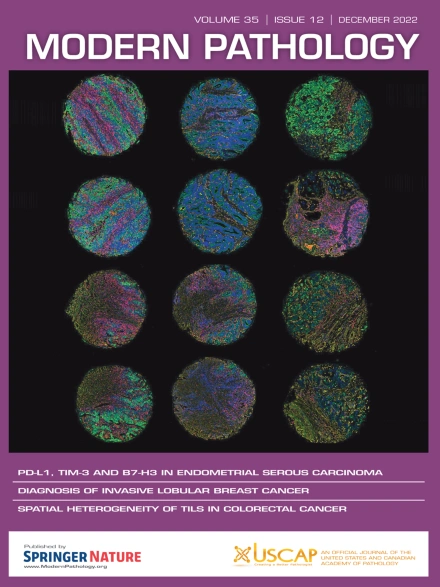Multiregion Genomic Analysis of Human Pancreatic Mucinous Cystic Neoplasms
IF 5.5
1区 医学
Q1 PATHOLOGY
引用次数: 0
Abstract
Mucinous cystic neoplasms (MCNs) are precursors to invasive pancreatic cancer. Conflicting clinical management recommendations call for better molecular characterization to improve our understanding of their tumorigenesis and risk assessment. We sampled epithelial tissue from a total of 18 surgically resected MCNs and performed dedicated multiregion analysis of somatic genetic alterations by targeted next-generation sequencing of 25 driver genes. In addition, we performed whole-exome sequencing and immunohistochemistry on selected samples to supplement our analyses. In total, 128 samples of epithelial MCN tissue were sequenced and analyzed, including samples from 13 small MCNs with low-grade (LG) dysplasia, 1 small MCN with high-grade (HG) dysplasia (HGD), and 4 large MCNs with HGD. Eight of 13 (61.5%) comprehensively sampled small LG MCNs lacked somatic driver gene mutations in all tissue blocks. These MCNs were lined by predominantly flat epithelium. In contrast, the majority of MCNs with driver gene mutations were predominantly lined by mucin-rich epithelium. No heterogeneity in KRAS mutations was seen across the sampled regions. Multiregion genetic analysis of 4 large MCNs with HGD provide insights into neoplastic progression, with shared somatic alterations suggesting that HGD arises from LG mucin-rich epithelium. These findings were supported by complementary whole-exome sequencing studies in 26 MCN epithelium samples. The neoplastic epithelium in the majority of small MCNs does not harbor somatic mutations in pancreatic driver genes. The genetic findings from multiregion analysis on MCNs contrast previous investigations in other mucin-producing pancreatic cysts, indicating distinct mechanisms in early tumorigenesis. This calls for a more nuanced risk assessment in MCNs, requiring improved preoperative assessment tools.
人胰腺粘液囊性肿瘤的多区域基因组分析。
粘液囊性肿瘤(mcn)是侵袭性胰腺癌的前兆。相互矛盾的临床管理建议需要更好的分子表征,以提高我们对其肿瘤发生和风险评估的理解。我们从总共18个手术切除的mcn中取样上皮组织,并通过对25个驱动基因的靶向下一代测序对体细胞遗传改变进行了专门的多区域分析。此外,我们对选定的样本进行了全外显子组测序和免疫组化,以补充我们的分析。总共对128个上皮性MCN组织样本进行了测序和分析,包括13个低级别发育不良的小MCN, 1个高级别发育不良的小MCN和4个高级别发育不良的大MCN。13个小的低级别mcn中有8个(61.5%)在所有组织块中缺乏体细胞驱动基因突变。mcn以扁平上皮为主。相比之下,大多数驱动基因突变的mcn主要由富含黏液的上皮内衬。KRAS突变在采样区域内没有异质性。对四个伴有高级别非典型增生的大mcn的多区域遗传分析提供了对肿瘤进展的见解,共同的体细胞改变表明高级别非典型增生起源于低级别富黏液上皮。这些发现得到了26个MCN上皮样本的互补全外显子组测序研究的支持。大多数小mcn的肿瘤上皮不含胰腺驱动基因的体细胞突变。mcn的多区域遗传分析结果与先前对其他产生黏液的胰腺囊肿的研究结果形成对比,表明早期肿瘤发生的不同机制。这就要求对mcn进行更细致的风险评估,需要改进术前评估工具。
本文章由计算机程序翻译,如有差异,请以英文原文为准。
求助全文
约1分钟内获得全文
求助全文
来源期刊

Modern Pathology
医学-病理学
CiteScore
14.30
自引率
2.70%
发文量
174
审稿时长
18 days
期刊介绍:
Modern Pathology, an international journal under the ownership of The United States & Canadian Academy of Pathology (USCAP), serves as an authoritative platform for publishing top-tier clinical and translational research studies in pathology.
Original manuscripts are the primary focus of Modern Pathology, complemented by impactful editorials, reviews, and practice guidelines covering all facets of precision diagnostics in human pathology. The journal's scope includes advancements in molecular diagnostics and genomic classifications of diseases, breakthroughs in immune-oncology, computational science, applied bioinformatics, and digital pathology.
 求助内容:
求助内容: 应助结果提醒方式:
应助结果提醒方式:


